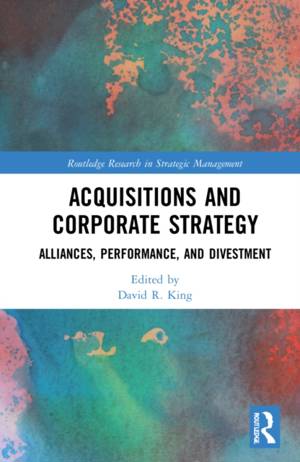
- Retrait gratuit dans votre magasin Club
- 7.000.000 titres dans notre catalogue
- Payer en toute sécurité
- Toujours un magasin près de chez vous
- Retrait gratuit dans votre magasin Club
- 7.000.0000 titres dans notre catalogue
- Payer en toute sécurité
- Toujours un magasin près de chez vous
Acquisitions and Corporate Strategy
Alliances, Performance, and Divestment
Description
Corporate restructuring (acquisitions, alliances and divestment) is a visible form of corporate strategy. For example, firm investments in buying and selling assets exceed the gross domestic product of the majority of nations. Most research in this area examines acquisitions, but informing practice is limited by examining acquisitions in isolation or using a narrow focus. For example, a lingering problem is that average acquisition performance is consistently around zero, suggesting a need to identify practically relevant relationships.
In addressing this need, research on three fundamental questions is covered: 1) How do acquisitions relate to other corporate strategy options?; 2) What helps to predict acquisition performance?; and 3) What are persistent acquisition research issues? The first question is intended to overcome a research limitation that acquisitions are often examined independent of other corporate strategies, including internal development, alliances, and divestment. The second question addresses novel relationships associated with the primary focus of acquisition research in examining what drives acquisition performance. The third question reflects on the underlying complexity of the phenomenon that makes it a challenge to identify what drives acquisition performance. Overall, the intent of presenting ideas on these fundamental questions is to illustrate promising areas for future research.
This book presents the latest state of knowledge on the topic and will be of interest to researchers, academics, and advanced students in the fields of strategic management, international business, and organizational studies.
Spécifications
Parties prenantes
- Editeur:
Contenu
- Nombre de pages :
- 260
- Langue:
- Anglais
- Collection :
Caractéristiques
- EAN:
- 9781032036366
- Date de parution :
- 19-04-22
- Format:
- Livre relié
- Format numérique:
- Genaaid
- Dimensions :
- 152 mm x 229 mm
- Poids :
- 535 g

Les avis
Nous publions uniquement les avis qui respectent les conditions requises. Consultez nos conditions pour les avis.





